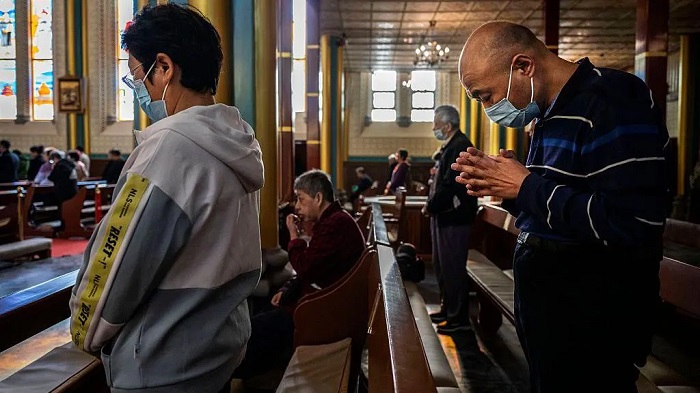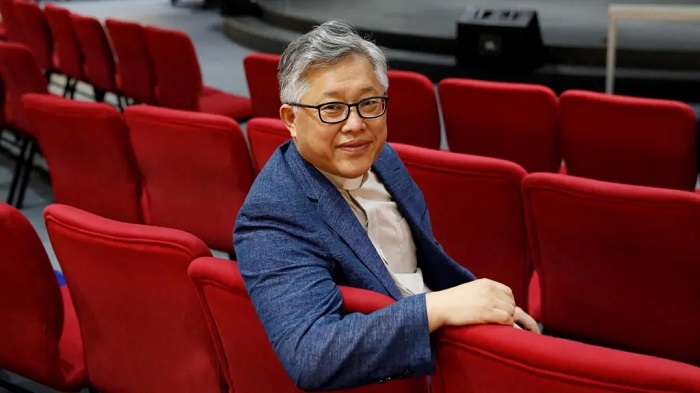Last Friday Grace Jin Drexel received a text from her father in China, the prominent pastor Jin Mingri, telling her to pray for another pastor who had gone missing.
The text said that the other pastor had been detained while visiting the southern city of Shenzhen.
"Shortly after that, I got a call from my mum. She said she couldn't contact my dad," Ms Jin Drexel, who lives in the US, told the BBC.
Within hours her family realised that Mr Jin had also been caught up in what has been described by activists as China's largest arrest of Christians in decades.
Some now fear that last weekend's roundup of 30 Christians linked to the Zion Church network, which Mr Jin founded, marks the start of what could be a wider crackdown on underground churches.
They point to new laws passed in China which appear aimed at curbing underground church activity, and increasing pressure exerted by authorities on church members in recent months.
Despite being ruled by the atheist Chinese Communist Party, China has a sizeable Christian population. Government figures in recent years have stated there are about 38 million Protestants and nearly six million Catholics.
But these figures likely only account for members of churches registered with the officially approved Catholic Patriotic Association and the Protestant Three-Self Patriotic Movement, which emphasise loyalty to China and the Communist Party.
Rights activists and scholars estimate that tens of millions more Chinese attend unregistered churches, also known as house churches, which do not follow state-sanctioned ideologies.
Many of these churches have been impacted by the Chinese government's attempts to increase its control of religious groups over the years. Church buildings have been demolished and crosses have been removed from public view, while religious material has become more tightly policed, with some Christian apps banned in China.
In 2005 and again in 2018, the government revised and tightened regulations on religious groups, while in 2016, Chinese leader Xi Jinping called for the "sinicisation" of religion.
Underground churches such as Zion were especially affected by the 2018 rules, which required government approval for worshipping in public. Many were forced to stop public activities and turned to holding online services, or simply shut down.
The following years also saw the arrests and sentencing of a few prominent pastors.
In recent months, there have been signs of Chinese authorities once again tightening the screws.
In May, pastor Gao Quanfu of the Light of Zion Church in Xi'an was detained on charges of "using superstitious activities to undermine the implementation of law". The following month saw several members of the Linfen Golden Lampstand Church in Shanxi sentenced to years in prison for fraud, which rights groups have criticised as false convictions.
Then in September, authorities announced a new online code of conduct for religious personnel, which only allows online sermons to be conducted by licensed groups. This has been widely seen as an attempt to curtail underground churches' online services.
In the last few months, Zion church members have also faced increasing questioning by police officers, Ms Jin Drexel said.
Many in Zion saw the stepped-up pressure as a prelude to a crackdown, but few anticipated it would be as large as it turned out to be, she said.
Last Friday and Saturday, Chinese authorities launched what's been described as a sweeping crackdown across at least 10 cities, including Beijing and Shanghai. Besides Mr Jin who was taken from his main base in Beihai city in Guangxi province, they arrested other pastors, leaders and members of the congregation, according to the church.

The BBC has obtained a copy of what appears to be an official detention notice for Mr Jin, issued by the public security bureau in Beihai. It states that Mr Jin is currently held in the Beihai Number Two prison and that he is suspected of "illegal use of information networks".
The BBC has asked local authorities to confirm the detention.
Some of the arrested church members have since been released, but the majority are thought to still be in detention, with some housed in the same prison as Mr Jin.
Corey Jackson, founder of Christian advocacy group Luke Alliance, said the nationwide scale and co-ordination of the arrests across China were unprecedented.
"We anticipate that this is just the beginning of a larger crackdown," he said, adding that other underground churches in China were now preparing themselves for arrests.
Another Christian advocacy group, Open Doors, said the arrests were significant. "Zion Church was very well known and outspoken and it may have reached the level of organisation that authorities are getting nervous about organised social entities they do not control," a spokesperson said.
He warned that China's "policy of acting against house churches will continue" and that authorities may accuse more church members of fraud and economic crimes "as a strategy of intimidation".
Sean Long, a Zion Church pastor and spokesperson based in the US, said other churches will be targeted as there is "a new wave of religious persecution emerging quickly across China".
He called the latest arrests a "systematic roundup" to "unroot Zion", and quoted the Chinese idiom "killing the chicken to scare the monkeys".
"Zion is the chicken, we are the most influential... it's to scare other Christians and house churches in China."
When asked by the BBC for a response, a spokesperson for the Chinese embassy in London said: "We would like to stress that the Chinese citizens enjoy freedom of religious belief in accordance with law. Meanwhile, all religious groups and religious activities must comply with the laws and regulations of China."
Earlier this week, a Chinese foreign ministry spokesperson said it "firmly opposes the US interfering in China's internal affairs with so-called religious issues", in response to US Secretary of State Marco Rubio's condemnation of the Zion church arrests.

Zion's story began with Jin Mingri, also known as Ezra Jin.
Born in 1969 during the Cultural Revolution in the north-eastern province of Heilongjiang, he was a believer in the Chinese state while growing up.
That changed in 1989 when, as a student in the prestigious Beijing University, he began taking part in the pro-democracy movement that was eventually crushed in the Tiananmen Massacre.
While he did not happen to be at Tiananmen on 4 June, the events at the square changed his life. "It was a pivotal moment. For his whole life, he had faith in the state. When that was betrayed, it shattered his entire world view. It was a big come-to-Jesus moment," Ms Jin Drexel said.
At first Mr Jin pursued his new Christian faith at a Three-Self church. In 2002 he moved to the US with his wife and daughter to study at a seminary in California, where his two sons were born.
The family moved back to China in 2007 for Mr Jin to continue his work. But he decided to set up an independent church, said Ms Jin Drexel, as he could no longer accept the Three-Self doctrine which calls for allegiance to the Chinese state. "He couldn't be a pastor there as it was not a God-pleasing church... you can't serve two masters."
Zion began as a small house church in Beijing with just 20 followers. But over the years it expanded and began holding services in a large hall in an office building.
As it grew in influence, so did the scrutiny. In 2018, Chinese authorities asked the church to install CCTV cameras in the building, saying it was for "security".
When it refused, followers began facing what church leaders say was harassment. Later that year, the church was shut down.
An exit ban was imposed on Mr Jin, who was placed under close surveillance. His family was able to leave for the US, as did some other church members such as Mr Long.
Zion then pivoted to what Mr Long called a "hybrid model" where they would hold large online church services coupled with small offline meetings in person. The church grew to about 100 branches across 40 cities in China, and has more than 10,000 followers now.
It is why, while the fate of Mr Jin and the other arrested church members remains uncertain and the possibility of a wider crackdown looms, Mr Long is confident that Zion and China's underground churches will survive.
"Persecution cannot destroy the church," he said. "If you look back to history, where there is repression, there's a revival."

